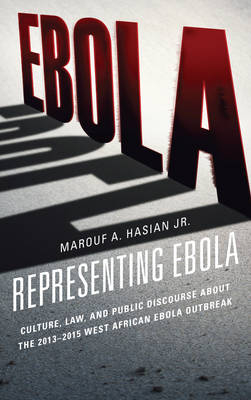
Representing Ebola
Fairleigh Dickinson University Press (Verlag)
978-1-61147-956-0 (ISBN)
Representing Ebola provides readers with a critical legal analysis of the recent West African Ebola Outbreak. The author argues that a review of the scientific, military, legal, economic, political, and mediated coverage of this latest outbreak highlights the ways that organizations like the World Health Organization or Doctors Without Borders want to conceptualize the importance of rapid emergence from the West during African Ebola epidemics. The author concludes that while the U.S. military and other organizations prided themselves on their belated responses to this outbreak oftentimes journalists, scientists, and others overlooked the contributions that were made by contract tracers and indigenous public health workers. Sadly, the 2013-2015 West African outbreak took the lives of thousands of individuals, and the author contends that this contributed to sensationalist ways of representing local burial and food habits. The book concludes by noting that while many West African leaders appreciated the billions of dollars of promised aid that would flow toward this region in the wake of the Ebola outbreak real “health security” measures have to involve longer term infrastructural changes. Talk of how Westerners rescued the West Africans need to be augmented with more nuanced ways of thinking about how many of those who actually battled Ebola need to become part of future conversations regarding everything from theories of “aerial” transmission to the steps that need to be taken during the first few weeks of recorded outbreaks.
Marouf A. Hasian Jr. is professor of communication at the University of Utah.
Acknowledgments
Chapter 1: Arguing About the Cultural and Legal Meanings of the 2013–2015 West African Ebola Outbreak
Chapter 2: NGO Organizational Tales, the Discovery of “Patient Zero,” and MSF’s Stories about the Origins of the 2013–2015 West African Ebola Outbreak
Chapter 3: The Legal and Ethical Duties that are Owed to “Contact Tracers” and Other West African Volunteers
Chapter 4: The Saga of Kaci Hickox and the Nature, Scope, and Limits of Human Rights Discourses in Ebola Contexts
Chapter 5: The IMF, the World Bank, and Debates about the Role of Political Economy in Ebola Outbreak Contexts
Chapter 6: Anticipating the Ebola Apocalypse and American Mediascapes
Chapter 7: Liberia’s 2014 Autoimmunization of the West Point Suburb and the Return of the Colonial Cordon Sanitaire
Chapter 8: Belated Military Humanitarianism and American “Ebola Exceptionalism” During the West African Ebola Outbreak, 2014–2015
Chapter 9: The Legal and Cultural Legacies of the 2013–2015 West African Outbreak
Bibliography
About the Author
| Erscheinungsdatum | 25.07.2016 |
|---|---|
| Reihe/Serie | The Fairleigh Dickinson University Press Series in Law, Culture, and the Humanities |
| Verlagsort | Cranbury |
| Sprache | englisch |
| Maße | 162 x 232 mm |
| Gewicht | 549 g |
| Themenwelt | Sachbuch/Ratgeber ► Gesundheit / Leben / Psychologie ► Krankheiten / Heilverfahren |
| Studium ► Querschnittsbereiche ► Infektiologie / Immunologie | |
| Studium ► Querschnittsbereiche ► Prävention / Gesundheitsförderung | |
| Recht / Steuern ► EU / Internationales Recht | |
| Recht / Steuern ► Privatrecht / Bürgerliches Recht ► Medizinrecht | |
| Sozialwissenschaften ► Soziologie | |
| ISBN-10 | 1-61147-956-8 / 1611479568 |
| ISBN-13 | 978-1-61147-956-0 / 9781611479560 |
| Zustand | Neuware |
| Informationen gemäß Produktsicherheitsverordnung (GPSR) | |
| Haben Sie eine Frage zum Produkt? |
aus dem Bereich


